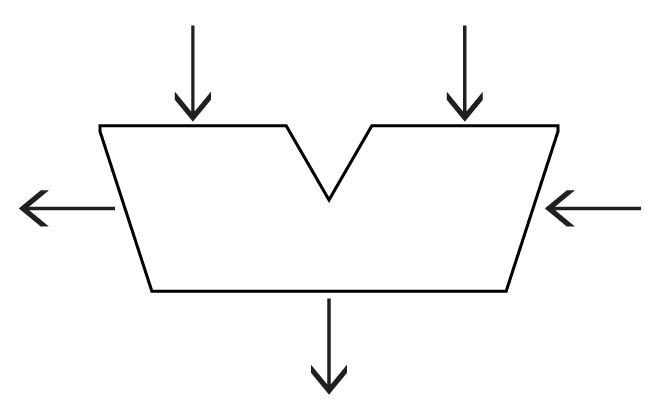If you are uncertain about how to answer any of these questions, I suggest you try using the course forum to discuss them.
-
Label the inputs and outputs of this ALU symbol for the full MIPS ALU designed in the textbook. Show
the number of wires for each input and output:
 .
.
-
Label the inputs and outputs of this ALU symbol for the ALU developed in Assignment 3. Show
the number of wires for each input and output:
 .
.
- True or False: Quartus software does not allow the same project to contain both Verilog and schematic diagram modules.
- What is the purpose of a “testbed” module?
- How do you incorporate one module inside another one in Quartus? Your answer should involve the use of pins and symbols.
- What operation has to be performed before you can use the Pin Planner for a Quartus project?
- Using the letters A-G to name the segments of a seven-segment display, tell which segments would be turned on for each of the following 4-bit values: 00002, 00012, 00102, …, 11112
- What is the difference between a bus line and a node line?
- If a node line connects to a bus line, how do you tell which wire in the bus it connects to? (Explain how wires are named and how subscripts are used.)
- List the names of all the inputs and outputs of an ALU slice, and briefly tell what purpose each one serves.
- Draw a diagram that shows the relationship between the A and Ainv inputs to generate the value used as one input to the AND gate.
- What is the difference between the relationship of Ainv to A and the relationship of Bneg to B inside an ALU slice? If there is no difference there, then what is the difference between the two?
- Explain the need for a wire symbol in the Quartus implementation of the ALU?
- Name the ALU function code bits from left to right, and tell what each bit does.
-
Generic Question: complete a row from the following table; an example row is given.
Hex Values A B Func CVNZ Result Problem 0 0 2 1 0 Explanation “The function code calls for the Add operation without inverting A or negating B.
0 & 0 => 0. C, V, and N are all false because there is no carry or overflow and the result is not negative. The Z bit is true because the result is all zeros.”Problem 0 0 1 Explanation Note: For AND and OR, you still need to tell how all four condition code bits will be set and why. (This is different from how this question was asked in previous semesters.) The only function code settings asked will be 0 (AND), 1 (OR), 2 (Add), 6 (Sub), 7 (SLT), C (NOR), and D (NAND). So there are only 16 × 16 × 7 possible questions to choose from!
(Quick: how many possible questions is that?)